David Hunter trial: Murder-accused pensioner says wife begged to die
- Published
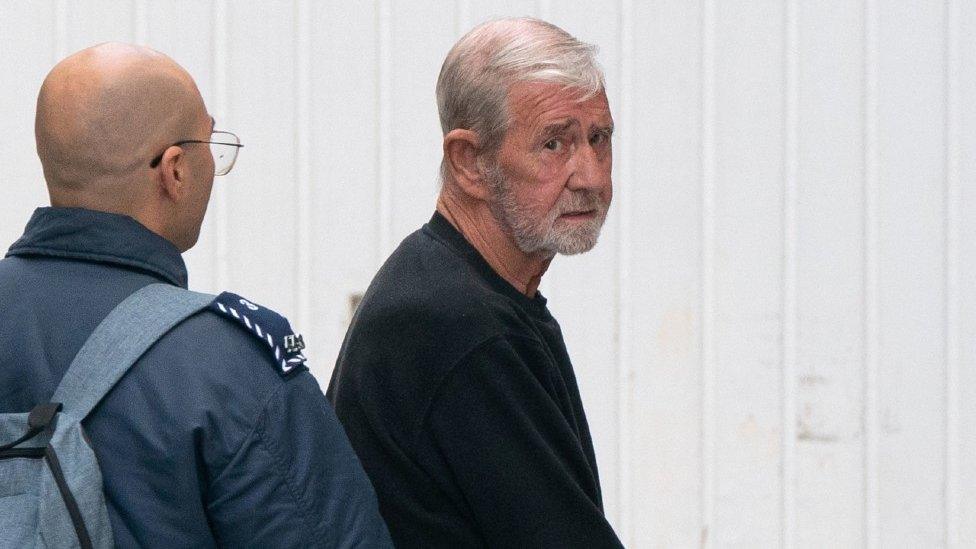
David Hunter, pictured at an earlier hearing, has been in custody since his wife's death
A British pensioner accused of murdering his ill wife has told a court in Cyprus she begged him to help end her life.
Janice Hunter, who was 74 and had cancer, died in December 2021 at home near Paphos.
Lawyers for her 75-year-old husband David, a retired Northumberland miner, say her death was assisted suicide.
Mr Hunter has admitted killing his wife but a plea deal on a lesser charge of manslaughter collapsed in December.
The trial has previously heard Mrs Hunter had a rare blood cancer but might not have had terminal leukaemia.
Giving evidence - at times tearfully - her husband said she asked repeatedly for help to end her suffering but that he "just couldn't do it".
He said he "regretted" what "I had to do".
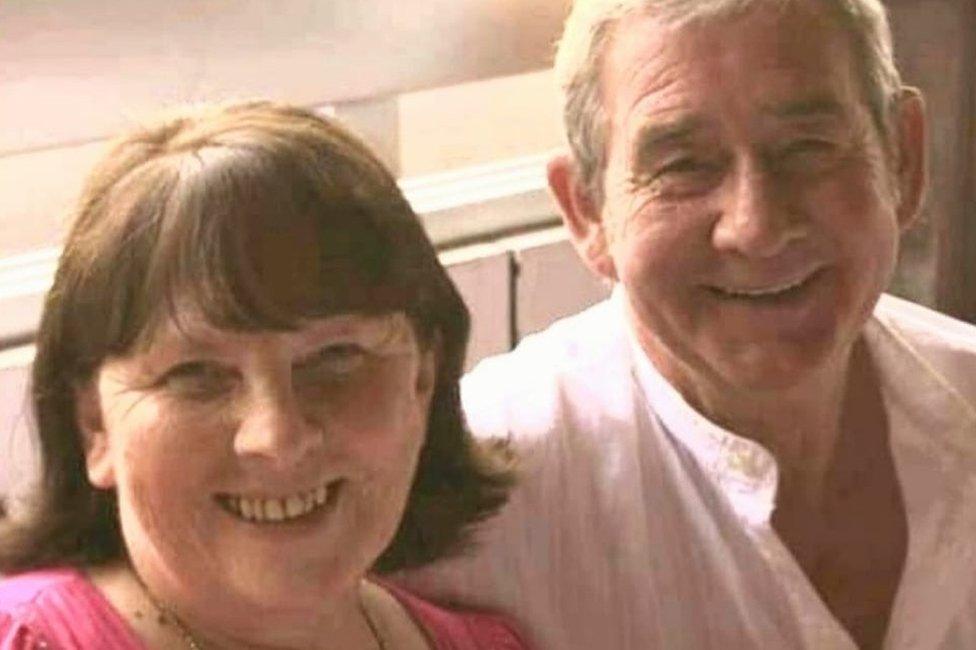
Janice and David Hunter had been together for more than 50 years
After his wife told him she was "sick of being alive" he reluctantly acted, he told the court.
"In the last four or five weeks, she asked me to help and I said 'no' every day," he told his trial.
"She asked me all the time and I always said 'no' - I didn't want to do it.
"After 57 years together, I just couldn't do it. In the last week she just cried and just cried and begged me to help her. I didn't answer."
Mr Hunter said his wife told him she felt she had "no life" due to her repeated trips between hospital and home.
He told the court at one point she became "hysterical" and to calm her down he said he would help end her suffering even though he said he had no intention of doing so.
'Mind switched off'
However, on the day of her death, he said he had got up to make coffee and his wife was crying.
Asked by the defence barrister what he remembered, he said his "mind switched off - I never wanted to kill her".
He added he then suffocated his wife with his hand.
"I don't even know how I thought about it," he said.
"I don't know how long I kept my hands there for. She did not attempt to stop me.
"In my statement I said that she was resisting but she wasn't. She was moving her head. I don't even think she opened her eyes."
Asked about his feelings for her, Mr Hunter said he loved his wife and added: "I regret what I had to do.
"I would never help her take her life if she hadn't begged me."
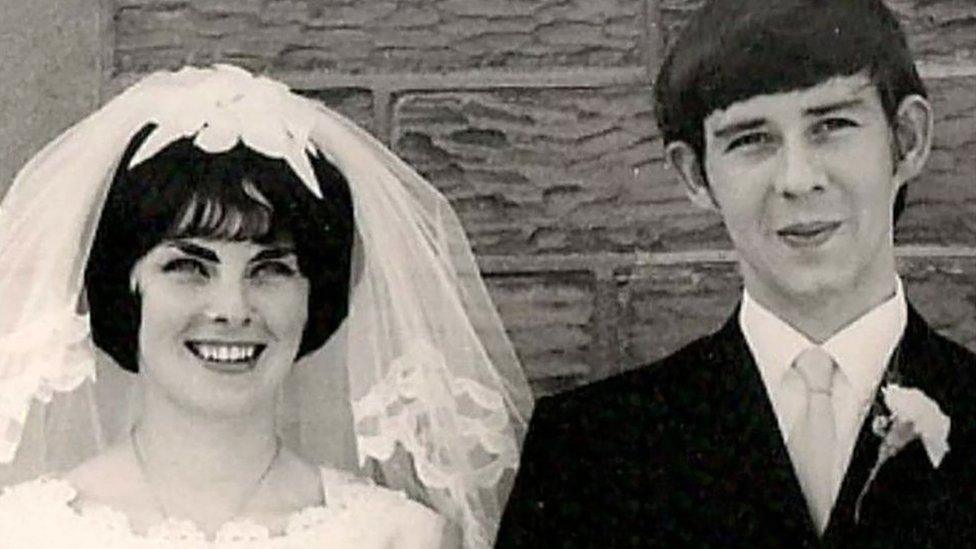
David Hunter told the court he loved his wife Janice
As he recounted his wife's final few weeks, he said: "She cried. She couldn't do nothing. She couldn't move.
"She was sleeping in the leather chair downstairs and for the last week we slept down on those chairs together."
Responding to a question from defence lawyer Ritsa Pekri, Mr Hunter said his wife had been unable to look after herself.
"The last two or three days, she said she couldn't move her arms and had trouble with her legs. She couldn't balance.
"She was only eating soup. She couldn't hold anything down. She lost a lot of weight."
'Lying in pain'
Under cross-examination from state prosecutor Andreas Hadjikyrou, Mr Hunter said he had been hoping for a "small miracle" to help his wife's health improve and that she would change her mind about wanting to die.
He said: "My mind was full 24 hours a day thinking of my wife. She was lying in pain, suffering, I couldn't do anything to help her.
"I wanted her to change her mind. I kept saying it's not easy [to help someone die], you can't just do something like that.
"I had no intention of killing her.
"It was her decision, she didn't want any more treatment. I can't tell her, she's got her own mind and she asked me. She wasn't just my wife, she was my best friend.
"You haven't seen the strain of the last six years, what she's gone through - the situation, the pressure. I wouldn't like anyone to go through the last six months we both went through."
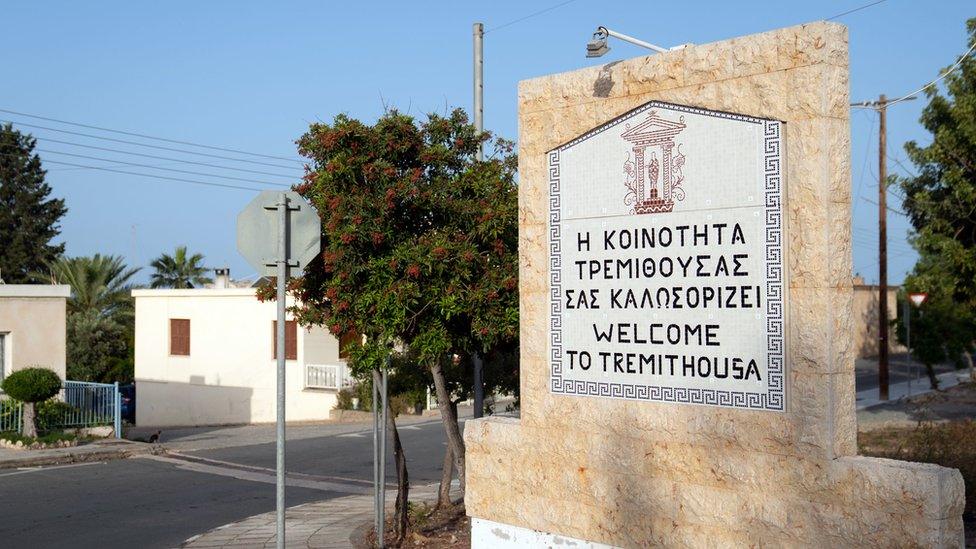
The retired couple lived in Tremithousa, near Paphos
Asked by the prosecution why he had told a doctor he had decided to end his wife's life but not tell her in case she changed her mind, Mr Hunter said he was "under so much pressure" and there were some things he could not remember as a result of a stroke.
He said he had told his wife that if she did die, he would have to take his own life, saying to her: "I don't want to be without you for the rest of my life."

In court
By Fiona Trott
BBC News North of England correspondent
David Hunter had waited 17 months for this.
Finally, he could give his own version of events to the three judges who will decide his fate.
Wearing a black shirt and black jeans, the grandfather walked into the courtroom looking composed. He spoke for more than four hours through a translator.
It was a painful testimony. There were tears when he talked about the final moments of his wife's life and smiles when he spoke about their marriage.
In a trial for the murder he denies, today was an important day for him to explain why he says it was not premeditated, but a last-minute decision - and therefore, assisted suicide.
This is being seen as a test case in Cyprus where euthanasia is strongly opposed by the Orthodox Church.

Earlier in the trial, the court heard Mr Hunter contacted his brother on Facebook to say he had killed his wife and then tried to take his own life at their home in Tremithousa.
Cypriot police were alerted by Interpol in the UK shortly before 20:00 GMT on 18 December 2021.
Officers arrived at the couple's retirement property and Mr Hunter was taken to hospital and later arrested.
The couple had moved from Ashington to Paphos 20 years ago.
After the day's proceedings drew to a close, Mr Hunter spoke to reporters about giving evidence and said: "I got my say, this is what I wanted. To tell them things that they never even thought about."
At home in the UK, the couple's daughter Lesley Cawthorne said it had been "a very emotional experience to see my dad have to relive the worst day of his life".
The trial continues.

Follow BBC North East & Cumbria on Twitter, external, Facebook, external and Instagram, external. Send your story ideas to northeastandcumbria@bbc.co.uk, external.
- Published10 May 2023
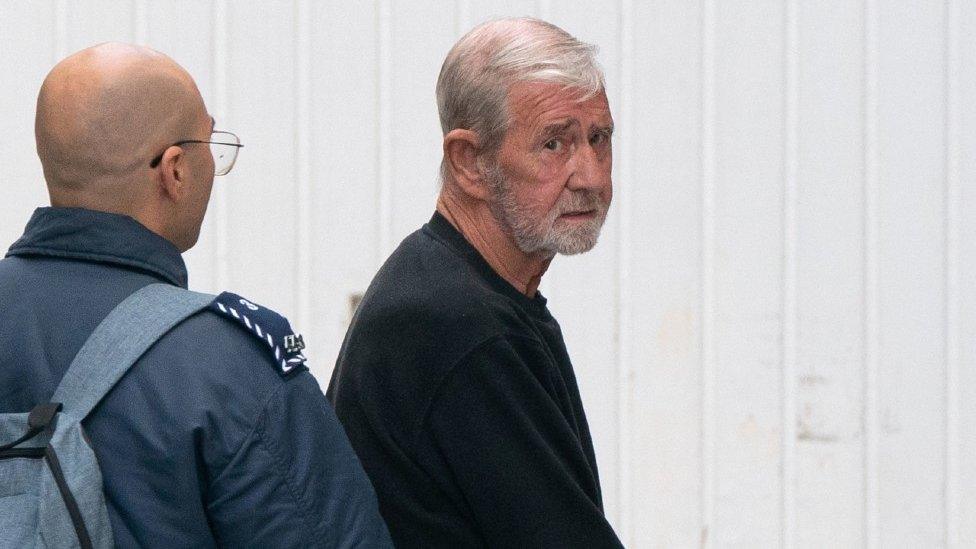
- Published8 May 2023
